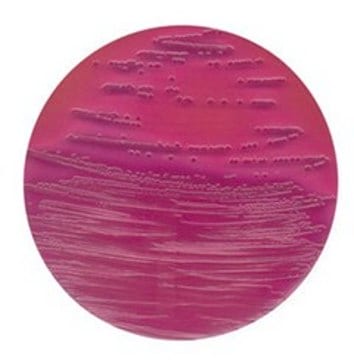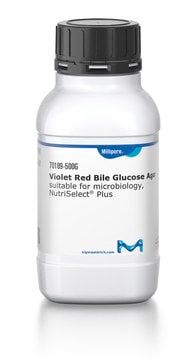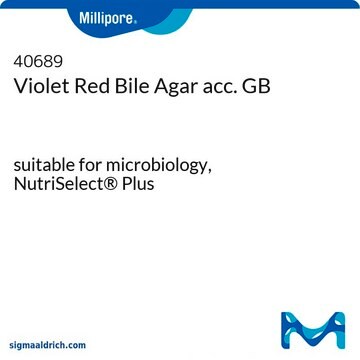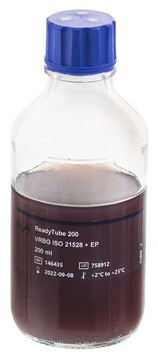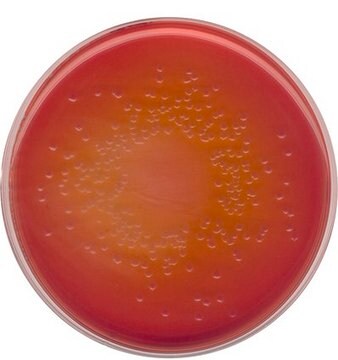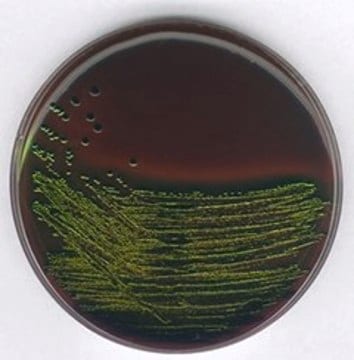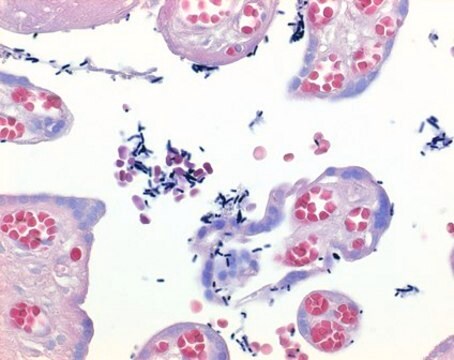1.04030
VRB (Violet Red Bile Lactose)-MUG agar
FluoroCult®, FDA-BAM, suitable for microbiology, for Escherichia coli, for coliforms
Synonym(s):
Coliform selective agar, MUG Violet Red Bile Agar, VRB-MUG agar, Violet Red Bile Agar with MUG, Violet Red Bile Lactose-MUG agar
About This Item
Recommended Products
agency
FDA-BAM
Quality Level
form
medium granules (dehydrated (DCM))
packaging
pkg of 500 g
manufacturer/tradename
FluoroCult®
storage condition
(Keep tightly closed and dry.)
technique(s)
microbiological culture: suitable
color
pink
pH
7.3-7.5 (25 °C, 39.6 g/L in H2O)
solubility
39.6 g/L (after autoclaving)
bulk density
620 kg/m3
application(s)
food and beverages
microbiology
storage temp.
15-25°C
suitability
Escherichia coli
coliforms
Related Categories
General description
Application
Features and Benefits
- Fluorocult® fluorogenic culture media offer Rapid and Reliable culture testing
- Powerful alternatives to conventional microbiological methods for the rapid and sensitive detection of bacteria
- Offers superior granulated culture media
- Safe and sustainable due to reduced risks associated with fine dust and toxic substance inhalation, resulting in a safer work environment
- Excellent wettability, solubility, and free-flowing properties
- Convenient, with minimal component separation and clumping, even under warm or humid conditions
- High batch-to-batch reproducibility
- Prolonged shelf life of up to five years
- High number of test strains exceeding all regulatory demands
Analysis Note
Appearance (color): dark red
pH-value (25 °C): 7.2 - 7.6
Solidification behaviour (2 hrs., 45 °C): liquid
Growth promotion test in accordance with the current version of DIN EN ISO 11133.
Growth(Escherichia coli ATCC 8739 (WDCM 00012)): good to very good
Growth Escherichia coliATCC 25922 (WDCM 00013): good to very good
Growth (Pseudomonas aeruginosa ATCC 27853 (WDCM 00025)): no limit
Growth (Enterococcus faecalis ATCC 19433 (WDCM 00009)): total inhibition
Growth (Enterococcus faecalis ATCC 29212 (WDCM 00087)): total inhibition
Colonies (Escherichia coli ATCC 8739 (WDCM 00012)): red with precipitation halo
Colonies (Escherichia coli ATCC 25922 (WDCM 00013)): red with precipitation halo
Colonies (Pseudomonas aeruginosa ATCC 27853 (WDCM 00025)): colourless to beige
Fluorescence (Escherichia coli ATCC 8739 (WDCM 00012)): + (poor)
Fluorescence (Escherichia coli ATCC 25922 (WDCM 00013)): +
Fluorescence (Pseudomonas aeruginosa ATCC 27853 (WDCM 00025)): + (greenish)
Incubation: 18 - 24 hours at 35 °C aerobic.
Legal Information
related product
Storage Class
11 - Combustible Solids
wgk_germany
WGK 3
Certificates of Analysis (COA)
Search for Certificates of Analysis (COA) by entering the products Lot/Batch Number. Lot and Batch Numbers can be found on a product’s label following the words ‘Lot’ or ‘Batch’.
Already Own This Product?
Find documentation for the products that you have recently purchased in the Document Library.
Articles
Selective media enable faster results and visual confirmation for the detection, identification, and enumeration of microorganisms
Our team of scientists has experience in all areas of research including Life Science, Material Science, Chemical Synthesis, Chromatography, Analytical and many others.
Contact Technical Service